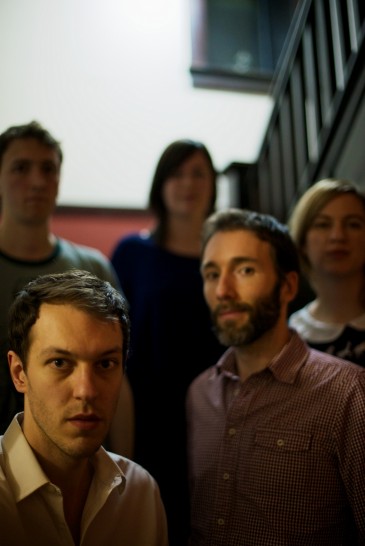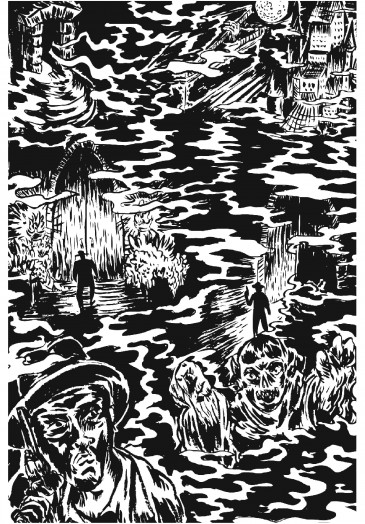
Carl Orff’s political convictions are highly contested. Having composed Carmina Burana during the rise and reign of Nazism in Germany, his orchestral masterpiece remains muddied in scrutiny. This scrutiny, so often souring into condemnation, is misplaced on his music. When it comes to personal beliefs, art is divorced of authorship.
Art and ego are not as autonomous. While it is a fallacy that art is a moral extension of its creator, it is a verity that no art is without an author. Ego does not live in a work of art, but in the ties between that work and its maker. Treading these ties can incite feelings of pride or shame. To a more vulnerable artist, shortcomings sear and scar, sometimes so painfully that the artist retreats entirely.
Recovering from self-imposed creative restraint is not an easy process. Patrick Geraghty of Vancouver rock band Role Mach is a veteran survivor of his own limitations. On March 28, Geraghty will be releasing two Role Mach albums that have been collecting dust over the past few years. By combating his insecurities with humility, Geraghty has found a way to tolerate the indestructible ego.

Selecting Christmas music on the toonie-eating jukebox in Reno’s, Geraghty and I pick up where the last 2010 Discorder feature on Role Mach left off. His Carl Orff-inspired album, Orffesques & Fugues, still stands as Role Mach’s only physical output. Geraghty explains the band’s guarded pace by recounting his musical beginnings.
As a teenager, Geraghty had a combinable obsession with home-recording and genre parody music, resulting in hundreds of self-produced songs. At the time he thought his efforts rebellious, but after releasing two albums (under an undisclosed moniker), embarrassment took hold. Feeling he had been misguided all along, Geraghty closed his musical career until 2005.

Reflecting back on the (self-perceived) failings of his early work, Geraghty comments, “It taught me a lot about making music, but not a lot about the restraint involved in putting out something that you can actually respect as you get older.” When he returned to music, he had a much humbled mindset. This time around, Geraghty planned to “let songs germinate for years before I pulled the trigger and actually did anything with them.”
True to his intent, Travels in the Interior Districts (recorded at Otic Sound with Josh Stevenson in 2011) and Holy Shades of Night (recorded with Tanis Gibbons at the Hive the following year) are being released later this month.
Travels is a cassette release inspired by Geraghty’s exploits in Africa and Europe in 2005/2006. The first track, “Via Delle Zite,” is named after a street he lived on during a summer in Naples; its verbose lyricism and crouching instrumental attacks project scenes of perilous urban living. “Shanklin Down” references the Julien Gracq novel A Dark Stranger. Its romancing saxophone riffs and low bass are idyllic inversions of the “unromantic experiences” Geraghty had on a lonely voyage to Britain’s Isle of Wight.
Holy Shades of Night is less conceptual. This seven-inch was composed two years ago during a wave of momentum following the recording of Travels. The songs are a jangly, haunted collection, inspired by Geraghty’s experiences in Vancouver that year.

Both albums are what Geraghty describes as “globalization rock.” The genre refers to a merging of his influences, ranging from Carl Orff to prog rock to Ethiopian jazz. As culminating as the genre, instrumental arrangements include a three-part horn section, saxophone, trumpet, and clarinet. Currently, however, the once 12-member group stands at six. The current lineup consists of Geraghty (guitar/lead vocals), Liz Horner (clarinet/vocals), Michelle Furbacher (trumpet) Jarrett Samson (bass), Tom Whalen (drums), and Aaron Cumming (saxophone).

Newly 30, Geraghty is resolved to be less susceptible to judgement. The two albums exemplify Geraghty’s integration of modesty into both the consumption and composition of his music. Regarding consumption, Geraghty insists there not be any credits on the physical releases of either album. He also decided that Travels and Holy should be given away for free at Role Mach’s March 28 show.

Examining these efforts, ambiguous album credits are a reach for humility, but as Geraghty admits, “Obviously I’m doing an interview on behalf of my band so I have some ego.” Just as, although the two albums are free, there is a cover charge for entry to the show. The connection between art and ego, like art and commerce, is resistant, maybe even relentless. Acknowledging this bond allows Geraghty to focus on minimizing their dependence.
In regards to composition, Role Mach’s music uses humour and derision to diminish its self-importance. Geraghty reasons, “I find it hard to enjoy or respect music that has no humility or sense of humour about it. With all art, I find if an ego weighs too heavily on something, it makes it really difficult to identify with the product.”

As applied to his specific sound, Geraghty says, “A huge ethos of Role Mach is taking songs that sound almost chauvinistic and have a lot of bravado to them and then writing about weakness and cowardice and trying to subvert the rock and roll.” Instead of outright mocking patriarchal ideals, he complicates them, winking away heavy-handed sincerity.
Largely reclaimed from his splayed pauses, the immensely talented Geraghty has learned to tolerate ego by weaving humility into both his songs and his relationship with those songs. If ego cannot abandon art, it can at least bow in imperfection.

